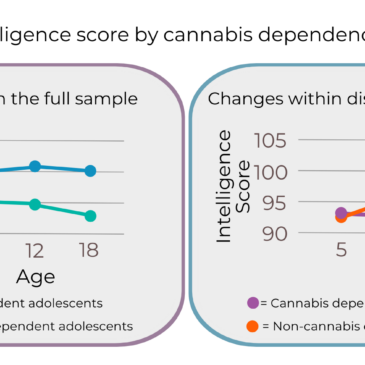Adolescents who use cannabis often show signs of cognitive impairment. It could be that cannabis causes these impairments. Another possibility is that underlying family risk factors– like socioeconomic status, parenting style, neighborhood, and educational opportunities– contribute both to cannabis use and cognitive impairment. Studying twins can help us tease apart these explanations, because twins share the same family background but don’t necessarily use substances in the same way. This week, STASH reviews a study by Madeline Meier and colleagues that explored how cannabis dependence among twins relates to IQ.
What is the research question?
Among pairs of twins, what is the relationship over time between IQ and cannabis dependence?
What did the researchers do?
The Environmental Risk (E-Risk) Longitudinal Twin Study tracked about 2,000 British twins from age 5 to 18. The researchers assessed intelligence at ages 5, 12, and 18.1 At age 18, participants reported on their symptoms of cannabis dependence (e.g., a need for greater and greater amounts of cannabis to become intoxicated). The researchers examined IQ scores at ages 5, 12, and 18 among those who were, or were not, dependent on cannabis at age 18.
What did they find?
About 4% of the sample (84 adolescents) reported being dependent on cannabis at age 18. Among all participants, those with cannabis dependence at age 18 had significantly lower IQ at all ages than those without dependence at age 18 (see left Figure). However, the researchers then looked only at the 57 twin pairs where one was dependent on cannabis and the other was not (i.e., discordant twins). When the researchers controlled for family background in this way, twins with cannabis dependence had about the same IQ at all ages as their co-twins without cannabis dependence (see right Figure).

Figure. Changes in intelligence by cannabis dependence status. Click image to enlarge.
Why do these findings matter?
Teens who were dependent on cannabis at age 18 had lower IQ scores even before they started using. These IQ differences did not emerge among pairs of twins from the same family, who, for the most part, experienced the same environment growing up. Together, these results suggest that cannabis dependence is not necessarily responsible for cognitive declines in adolescence, and that not accounting for family risk factors might create the false impression that cannabis dependence on its own causes cognitive impairment. Kids with family risk factors might benefit from family- and school-interventions to maximize their chances of healthy intellectual growth.
Every study has limitations. What were the limitations in this study?
Extending IQ measurements beyond age 18 could reveal cannabis effects later in life. Formal neuropsychological tests could more accurately measure cognitive functioning over time.
For more information:
Access free addiction help resources on The BASIS addiction resources page or call the national addiction helpline at 1-800-662-HELP (4357) for information on self-help resources.
— Pat Williams
What do you think? Please use the comment link below to provide feedback on this articles
________________
[1] Intelligence was measured at age 5 with the Wechsler Preschool and Primary Scale of Intelligence-Revised, at age 12 with the Wechsler Intelligence Scale for Children-Revised, and at 18 with the Wechsler Adult Intelligence Scale-IV.




